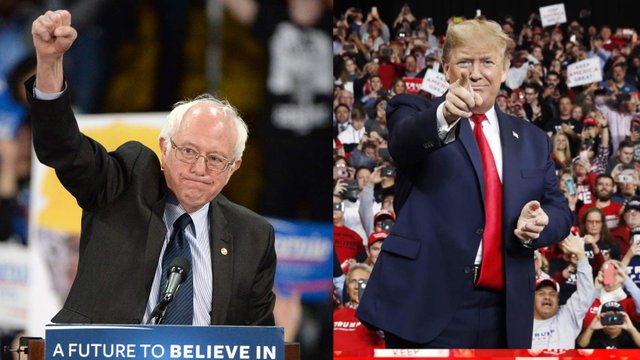
While asserting Bernie Sanders and Donald Trump have anything in common may, on its face, sound absurd. However, they do - at least for those paying attention; really watching and listening.
Let’s review: During the primaries leading up to the 2016 election, there were initially 17 Republican candidates vying for the office of President of the United States. Of those, Jeb Bush appeared to have the most party support, meaning simply that he was the candidate the RNC collective seemed to endorse and support. Among the remaining 16 candidates, Rand Paul stood on the Republican stage in name only as he had often strayed from the party line representing a more Libertarian line of politics, Ted Cruz was (then) considered representing the Republican far-right radical fringe and Donald Trump was the outsider and dark horse.
The Republican party clearly placed Jeb Bush front and center. However, among the remaining candidates, there were acceptable alternatives, most notably Marco Rubio. Both represented the party faithful; those who towed the party line. Ted Cruz represented a radical conservatism that the Republican party tolerated, but wasn’t ready to endorse or support. And, absolutely no one in politics took Donald J. Trump’s candidacy even remotely serious until he became the people’s choice. Then, with only the sole desire to beat the Democrats, and especially the Democratic candidate Hillary Clinton, did the Republican Party throw its machinery behind Donald J. Trump. Still, to protect the party’s interests, Republicans negotiated to have Reince Priebus incorporated into Trump’s team.
The whole point of the Priebus appointment was the party’s attempt to keep the Republican candidate in line with the Republican party (and the unspoken party line). Otherwise, Republicans had a ‘wild card’ on their hands with no idea (or control) over where this disruptive candidate might take them or their party.
But, that was exactly why the American people supported him. Donald J. Trump was the anti-Washington candidate. He represented the anti-status-quo. He advertised himself as the “Disruptor-in-Chief” and that was what the American people wanted. The American people wanted someone who would take on the bureaucracy, special interests and shake things up. Whether you like Donald J. Trump or not, he promised to ‘shake things up” and he has done just that. Furthermore, rather than the party controlling the candidate, the candidate has wielded his influence over the party.
That brings us to the 2020 election cycle and the re-emergence of Bernie Sanders and the DNC. In 2016, the DNC had thrown its support behind Hillary Clinton. However, Bernie Sanders still ran, acquired a tremendous following with a large number of delegates and was a thorn in the DNC’s side. During the 2016 DNC convention, some delegates accused the party of strong-armed tactics to push the DNC candidate, Clinton, to the forefront and nomination.
Now, here we are in the 2020 primary season and the run-up to the DNC convention. Out of the gates, the DNC faithful supported Joe Biden and encouraged him to run as their candidate. Despite Biden’s record and notoriety, he has not fared well in the polls nor done well in the first two primary elections. Who has? Bernie Sanders (although Pete Buttigieg, Amy Klobuchar, and Elizabeth Warren are still in the race with many more primary states yet to vote).
However, Bernie’s message has been consistent and doesn’t tow the party line. He’s still viewed as representing the radical left of the party. However, like Trump, he speaks to the anti-status-quo. And, despite being in politics for a number of years, Sanders represents ‘shaking things up’ on ‘behalf of the American people’ - NOT special interests.
For those paying attention, there has been a long-simmering discontentment amongst the American people going back to the formation of the Tea-Party movement (which initially was not a conservative movement, but simply a rebellion of the status-quo). This discontentment has only increased with the eruption of the Black Lives Matter movement, the Me-Too movement, and the 99% march on Wall Street and Washington following the Bank bailouts are to name but a few.
The common thread, regardless of party, is that people do not want the status quo. Instead, they want change - radical change. The up-risings that we have seen repeatedly within this country have exposed an undercurrent that has been continuously bubbling under the surface for some time. Individual Americans are tired of being ignored. Furthermore, they are tired of having the problems which are impacting their lives and livelihoods ignored. Life, Liberty and the Pursuit of Happiness is what Americans were promised; not the burdensome weight of bureaucracy and special interests. So yes, they want someone who will go to Washington and represent the built-up frustration they feel. They want a “Disruptor-in-Chief.”
Who will it be? Clearly, the Republicans have circled their wagons around re-electing Donald J. Trump, despite the grimace and clenched teeth of party moderates. As for the Democrats, the primaries continue. However, Bernie Sanders continues to represent a thorn in the side of the Democratic party with a consistent message of ‘going to Washington to shake things up for the American people.’ And, that message continues to resonate with the American people.
The swing vote used to be the moderate middle. However, it appears the swing vote has become the disenfranchised American individual voter. What do Bernie Sanders and Donald J. Trump have in common? They both represent the growing number of Americans who are frustrated with politics as usual; including ‘party politics.’ And, that is the vote they will both split should they happen to run against one another; the new apparent ‘swing vote.’
Posted from Election Central : https://www.uspresidentialelectionnews.com/2020/02/what-do-bernie-sanders-and-donald-trump-have-in-common/